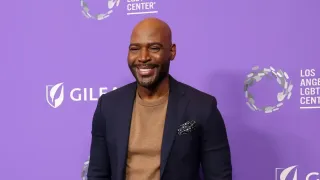March 9, 2014
'Blarney Blowout' Ends in 73 Arrests
Kilian Melloy READ TIME: 5 MIN.
Gay District 6 Supervisor Matt Dorsey’s idea to jettison San Francisco’s landmark law that requires companies doing business with the city to offer unmarried same-sex partners the same benefits as their married heterosexual colleagues is not a good one. With the supervisors about to start their August recess, we urge Dorsey to rethink his plan. And the other supervisors should make sure his plan is dead on arrival if he proceeds with legislation.
Many readers may not recall the fight to pass the equal benefit ordinance, or EBO. It was 1996, and same-sex marriage was not legal in the U.S. But domestic partnerships were the way that same-sex couples could secure some rights and benefits. Gay activists went to gay then-supervisor Tom Ammiano with their idea to make companies doing business with San Francisco offer benefits to their employees in domestic partnerships if they provided those benefits to straight married couples. The thought was that domestic partners would be able to obtain health insurance and other benefits.
The law, co-sponsored by lesbian then-supervisors Leslie Katz and Susan Leal, was groundbreaking. And it experienced significant headwinds from the Catholic Archdiocese of San Francisco and United Airlines, one of the city’s largest employers at the time that took the city to court and lost. Compromises were made with the Catholic Church to garner its support, with the end result being that the pool eligible for benefits became even more expansive. Entities could designate anyone in their household as eligible to receive the “spousal-equivalent” benefits. That could be a domestic partner, sibling, or another relative.
In fact, California still maintains a state-based registry for domestic partners, and lawmakers have expanded access to it over the years to officially recognize unions regardless of their sexual orientation over the age of 18. Many seniors, LGBTQ and straight alike, often opt for domestic partner status later in life for financial reasons.
San Francisco’s EBO, which went into effect in June 1997, has been a resounding success. It enabled same-sex domestic partners in other states to receive benefits if their company was complying with the EBO and wanted to do business in San Francisco. As gay former AT&T California president Ken McNeely said in 2017, the company was one of the first to offer benefits to domestic partners of its employees across the country.
"When AT&T got involved in equal benefits it was a lonely place in the corporate world," he said during an event in San Francisco marking the 20th anniversary of the law. McNeely, who is now retired, added that 10 years earlier the company had created its LGBTQ resource group.
That’s just one example. Now, Dorsey is floating his idea to repeal the law, and his main argument is that since same-sex marriage is now legal in all 50 states, domestic partnerships are no longer needed. He believes the EBO is costing city taxpayers too much money due to competitive bidding and compliance. To be sure, the city should clean up its contracting provisions, but repealing the EBO is not the way to go about it.
One of our objections, which we told Dorsey when he contacted us to discuss the matter, is that while marriage equality is the law now, that doesn’t mean it always will be. Republican President Donald Trump has shown that he doesn’t care about norms or how things have been done in the past. If he has an idea for something, he will twist arms to make it happen. A recent example is his domination over the Republican-controlled U.S. House and Senate to pass his One Big Beautiful Bill, which contains massive cuts to Medicaid and increases the deficit by trillions of dollars. Congress has abdicated its responsibility as a co-equal branch of government.
Over at the U.S. Supreme Court, the situation is just as bleak. The six-person conservative supermajority appears set for many years. Those conservative justices, too, are handing Trump victory after victory, from letting him fire federal workers to reining in lower court federal judges who have ruled against the administration. Court precedent is also at grave risk as the justices perform legal contortions to give the president what he wants.
One of those settled cases is Obergefell v. Hodges, the 2015 Supreme Court decision that legalized same-sex marriage nationwide. In fact, last month marked the 10th anniversary of that landmark decision. But three years ago, in Dobbs v. Jackson Women’s Health Organization, the court overturned the right to abortion in Roe v. Wade. In his concurring opinion in that case, Justice Clarence Thomas, one of the court’s most conservative members, wrote that other previously decided cases should be reexamined. Of those he mentioned, one was Obergefell.
Dorsey did acknowledge that. But he also doesn’t think domestic partnerships are an LGBTQ issue anymore. “Today’s equal benefits ordinance has nothing to do with LGBTQ+ equality, and hasn’t since 2015,” he told us.
Unfortunately, for all of us, that could change. And if that happens, we would need laws like the EBO on the books to protect same-sex couples who would no longer be able to legally wed.
With the looming cuts to Medicaid and the uncertainty that the Trump administration brings to the country on a host of other issues, now is not the time to repeal laws that help LGBTQs. We understand the goal of gay Board of Supervisors President Rafael Mandelman to implement what he described as modest changes to the city contracting process. But Dorsey wants to go much further and disassemble an effective law without a good reason. As Katz told us, sounding a warning about Trump, “I’m afraid with this administration; let’s not take something important off the books.”
Dorsey said that he has not yet drafted legislation that would repeal the EBO. This week, he did send a letter to the board’s legislative analyst’s office asking for a report on the estimated potential costs and to assess the actual enforcement and compliance costs to San Francisco taxpayers for provisions of the EBO.
Dorsey said that the city’s contracting provisions are hampering competition for services and that the city gets stuck paying more because companies have to jump through hoops to be eligible to compete. But his plan to repeal the EBO is short-sighted and, in our opinion, the wrong way to look at the issue. If he’s successful, and Obergefell is overturned by the Supreme Court, same-sex couples in domestic partnerships working for companies will be stripped of benefits that they would have had if the EBO had still been the law. San Francisco should not claw back benefits that have helped so many people and prompted numerous businesses to do the right thing and offer benefits equally to their employees.
San Francisco prides itself on its values, and one of those is LGBTQ equality. The EBO should not be repealed.






